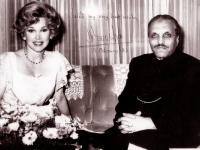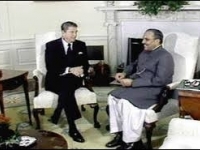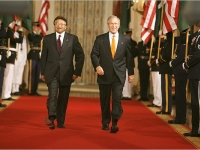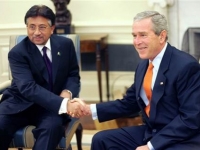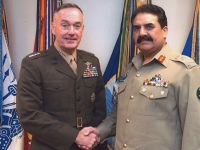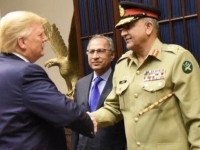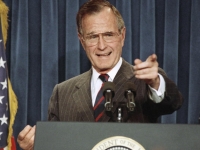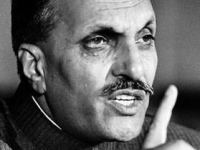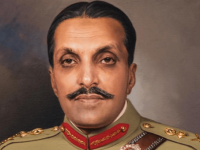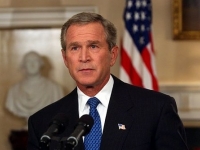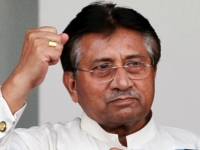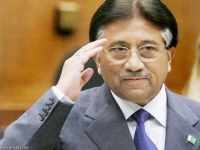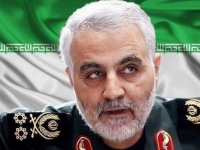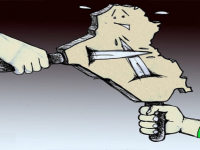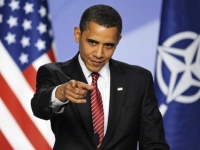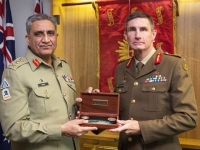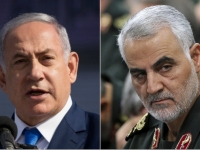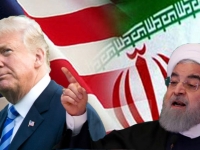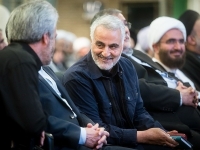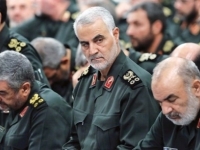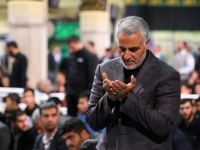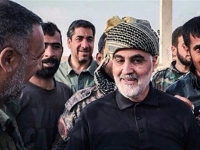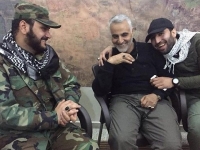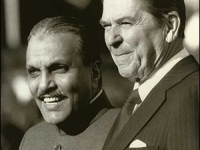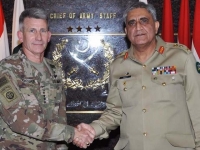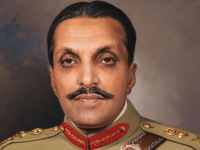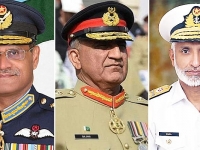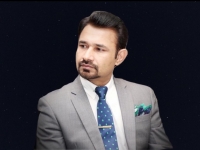News
Pakistan foreign policy is a key pillar of Neighbour Countries
SIDE EFFECTS OF AMERICANS FRIENDSHIP
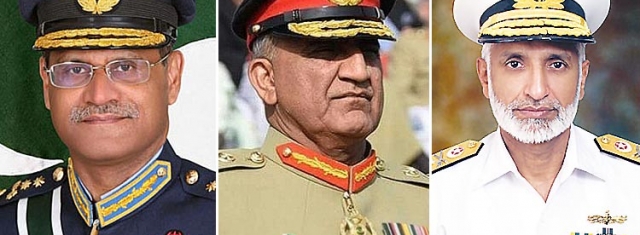
GENRAL QAMAR JAVED BAJWA and DONALD TRUMP (Source: AK)
USPA NEWS -
January 8, 2020 comments
Pakistan's foreign policy is a key pillar of Pakistan's friendly relations with neighboring countries, especially the Muslim countries. Pakistan has always been trying to resolve any misunderstanding between the brotherly countries through dialogue. The relations between Pakistan and Iran are historical and historical. Pakistan has always regarded Iran as sultry and proud. The two countries have, in the past, confronted each other in a time of uncertainty and hardship. Before the declaration of Pakistan, Iran recognized Pakistan. Similarly, when the Iranian Revolution Ayatollah Pakistan immediately assimilated and re-established its new government. Likewise, the motions of both countries are one of many global issues.
On the one hand, India is trying to find differences between the two countries, on the other, ignoring the bilateral tensions between the United States and the Iranians, where Qasim Sulamimani and Iraqi support for the Iranian-backed revolutionary leader in the US drone strike in Baghdad are supported by Qasim Sulamyani (Iraqi). The deputy commander of the PMF, Baramahdi Alhamands, was killed.
Pakistan's foreign policy is a key pillar of Pakistan's friendly relations with neighboring countries, especially the Muslim countries. Pakistan has always been trying to resolve any misunderstanding between the brotherly countries through dialogue. The relations between Pakistan and Iran are historical and historical. Pakistan has always regarded Iran as sultry and proud. The two countries have, in the past, confronted each other in a time of uncertainty and hardship. Before the declaration of Pakistan, Iran recognized Pakistan. Similarly, when the Iranian Revolution Ayatollah Pakistan immediately assimilated and re-established its new government. Likewise, the motions of both countries are one of many global issues.
On the one hand, India is trying to find differences between the two countries, on the other, ignoring the bilateral tensions between the United States and the Iranians, where Qasim Sulamimani and Iraqi support for the Iranian-backed revolutionary leader in the US drone strike in Baghdad are supported by Qasim Sulamyani (Iraqi). The deputy commander of the PMF, Baramahdi Alhamands, was killed.
The Iranian response also came as the US Air targeted another Hashid al-Shabaabi paramilitary force commander, raising concerns about the possibility of war in the region. According to the report, the US military base in Baghdad also fired firearms which did not cause any harm, but the new general of the Iranian Revolutionary Force has ordered the next list of 55 US installations to be targeted.
Who is General Qasim Sulaimani? If a person was considered powerful after Iran's leader Ayatollah Ali Khamenei, he was General Qasim Sulaimani. And when it comes to peace or war, the real Foreign Minister of Iran was. Sham, Iraq, was the head of all operations to protect Iranian interests in Yemen and Afghanistan.
He was considered the architect of Syria's President Bashar al-Assad's war against rebels in the country, the rise of pro-Shiite militias in Iraq, the war against the extremist Islamic State, and many more. He was generally regarded as a shy personality, but in recent years he has come to the fore when he gained popularity and popularity in Iran because of his actions against ISIS. Until a few years ago, many Iranian citizens could not recognize the road, became the subject of documentaries, video games, news and pop songs.
A music video produced by Iraqi Shiite militants was highly liked in Iran, showing soldiers spray-painting and parading in front of General Suleimani's wall on the wall, while the behind-the-scenes emotional music. Was added At the same time, General Suleimani's role in Iran's foreign affairs emerged.
He was no longer a hidden figure on the other side of the phone line. In 2013, former CIA official John Maguire told the US journal The New Yorker that Sulaimani was one of the most powerful activists in the Middle East. In an interview for a Persian documentary, former US ambassador to Iraq Raine Crocker also said that General Suleimani was instrumental in the Baghdad talks. According to Ryan Crocker, he also felt General Sulaimani's influence in Afghanistan when he was posted as US ambassador to Afghanistan. The people of Iran's mutual agreement with me in Afghanistan made it clear to me that General Suleimani was the only powerful person capable of making important decisions in the Iranian Foreign and Government setups. General Suleimani, considered to be a master of charismatic personality, had no shortage of disapprovals, and many stories circulated about his personality, especially since Suleimani's fans were appreciative of his bravery. He was regarded as the most deferential Diwmali figure.
In a special report published by the Washington Post on January 3, 2020 in the Washington Post, Aaron Blake revealed that General Qasim Sulaimani has completed several joint operations with the United States over the past few years. In The New York Times of September 30, 2013, Dexterfulkins published a story titled "The Shadow Commander" in which he revealed that "there was a time when Qasim Sulaimani was the only Iranian active hope for an alliance between the United States and Iran in Afghanistan after 9/11. In the present case, the Middle East is reshaping these days. Now he is directing the war in Bashar al-Assad in Syria and is in charge of carrying out operations outside the borders of the country, led by the Qudsirian force. "
According to White House high-level State Department official Raryn Crocker during the extraordinary days after the 9/11 attacks, a group of Iranian and military and civilian officials led by Qasim Sulaimani led a massacre in Geneva. Arrived on Saturday and Sunday for a very secret meeting. "Our meeting was so secret that he went back on Friday and then on Sunday, so no one in the office knew where I was," Crocker said. According to Crocker, Iranians called Sulaimani "Haji Qasim," and they wanted to help the US eliminate its mutual enemy, the Taliban. "The meetings were aimed at US and Iranian operations against the Taliban in Afghanistan. I had to help each other. According to the Washington Post, all of this was surprising because Iran's US diplomatic relations broke down in 1980 when US diplomats were held hostage for a long time in Tehran.
Crocker was not surprised to find that Sulaimani is flexible. "You don't live without practical ideas, even after eight years of cruel warfare," he said, sometimes sending messages to Sulaimani Crocker, but he refused to give any information in writing. According to Crocker, "Haji Qasim is very smart. He is not going to leave a paper trail for Americans. “
According to him, General Suleimani was in favour of strong action against the Afghan Taliban, providing the map to the Americans, information about the Taliban and al-Qaeda locations, as well as an al-Qaeda facilitator handed over to the US, who was detained in Iran. They were ready to provide all kinds of support from Iran to Afghanistan. According to Ryan Crocker, General Qasim Sulaimani also worked with the United States in Iraq on the condition that Iranian-backed militias in Iraq and all groups belonging to Iran, including the Mujahideen people. Protection should be provided and the United States should not take any action against them. General Suleimani also worked with the United States to establish a strong government in Iran that was under Iranian influence after the US invasion. According to Crocker, "Haji Qasim was very happy with our cooperation."
In the same way, General Sulaimani continued to work with the United States in operations against ISIS in Iraq. General Suleimani dealt with the Americans in many of the operations in which the US and Iran shared common interests, as well as bloodshed in Syria and Yemen, and General Qasim Sulaimani was instrumental in the bloodshed.
Despite this cooperation, the situation changed suddenly when, on January 29, 2002, President George W. Bush included Iran with Iraq and North Korea in his famous "Axis of Evil" speech. Bushman was blinded while no one from the three countries invaded New York and Washington. Bush in his 3900-word speech called these three states "axes of evil", pointing to weapons of mass destruction to Iraq, calling them a huge and growing threat to world peace. Giving up a new perspective, these weapons can be used by terrorists at any time, which they can blackmail us and our allies, and any cheap or sensible pricing on this matter will be devastating. Bush added: We will not allow terrorists to use materials, technology and skills to create and deliver weapons of mass destruction with our allies. According to Ryan Crocker, this was a devastating speech. Cooperation came to an end and all our hard work paid off. Bush's speech The next day, when I met at the US compound in Kabul to facilitate negotiations, he said in a very angry tone: "Qasim Sulaimani has shouted in a very angry message that the United States has hurt us a lot. After the risks, the United States will have to deal with it Relationship prgurkrrhy re full review. Remembering that time, Crocker shook his head. "We were just that close," he said. One word of a speech changed the history. "
In February 2003, a month before the US invasion of Iraq, Secretary of State, Colin Powell, told the UN Security Council: "We know that dictator Saddam Hussein is determined to maintain his weapons of mass destruction." And they intend to make more such weapons, but Saddam simply cheated and never got any weapons.
However, these days, Trump wants to get rid of the timE of bloodshed and needed a great sacrifice, and the Americans, in keeping with his tradition, sacrificed Qasim Sulaimani as a "cat kabakra". The Iranian government was forced to retaliate by pressuring US military base missiles. And also claimed the death of 80 people In response to the rejection, US President Trump has rejected the Iranian claim and avoided the war, and Iran has also called for a ceasefire, as the prime minister welcomed the Prime Minister. Urges to go to Arabia and America.
Americans call their foreign policy "disposable diplomacy", their philosophy is to buy, use and hang, before the American nation blades them, so they do not value their friends more than paper glasses, plates, and sock socks. These people always run Case Talkies and Project Topjacks.
General Qasim Sulaimani is not the first leader-general to be punished for American friendship before his friends are General Agostopnoshe, General Reza Shah Pahlavi, Philippine Kafernand Markhorse, Bishop Abel Minervieva in Rhodesia, or General Saddam Hussein. As long as they can serve for them, and the day they feel this person is becoming their "responsibility", they treat him like Zulfiqar Ali Bhutto, General Zia-ul-Haq and Musharraf, and then their graves. On the "former" seal. This is American friendship and its functioning and past. Twenty-two years have been following this same philosophy of "friendship" and it has not changed its policy for anybody to this day. Therefore, the requirement is that Assistant Vice-US Secretary of State Alice Wells in her tweet "Restore the Pakistani military training program" in the US National Security is subject to security and on this occasion,...,.
In his tweet, "Restoration of Pakistani military training program" is subject to US national security and on the occasion Pompeo Phone Contact ? I remembered our defence Man Qamar Javed Bajwa on Pakistan´s Defence Day and also the historical phrase in which he described the sacrifices of Pakistan and the American West. Do more .... “KA MASHWARA DIYA THA “. Therefore, our military spokesperson's statement that "we will not allow our land to be used against any brotherly country" is commendable.
more information: https://aurangzeb
Liability for this article lies with the author, who also holds the copyright. Editorial content from USPA may be quoted on other websites as long as the quote comprises no more than 5% of the entire text, is marked as such and the source is named (via hyperlink).

